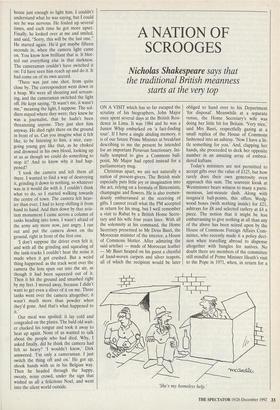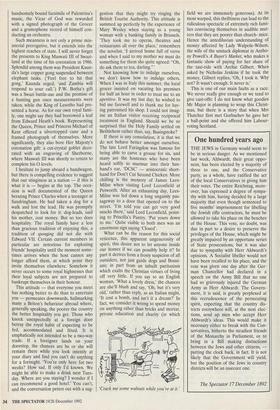A NATION OF SCROOGES
Nicholas Shakespeare says that the traditional British meanness starts at the very top
ON A VISIT which has so far escaped the scrutiny of his biographers, John Major once spent several days at the British Resi- dence in Lima. It was 1984 and he was a Junior Whip embarked on 'a fact-finding tour'. If I have a single abiding memory, it is of our future Prime Minister at breakfast describing to me the present he intended for an important Peruvian functionary. Ini- tially tempted to give a Commons ball- point, Mr Major had opted instead for a parliamentary mug.
Christmas apart, we are not naturally a nation of present-givers. The British male especially puts little joy or imagination into the act, relying on a formula of Bittermints, champagne and flowers. He is also tremen- dously embarrassed at the receiving of gifts. I cannot recall what the PM accepted in return for his mug, but I well remember a visit to Rabat by a British Home Secre- tary and his wife four years later. With all the solemnity at his command, the Home Secretary presented to Mr Driss Basri, the Moroccan minister of the interior, a House of Commons blotter. After admiring the said artefact — made of Moroccan leather — Mr Basri heaped on his guest a chestful of hand-woven carpets and silver teapots, all of which the recipient would be later obliged to hand over to his Department 'for disposal'. Meanwhile at a separate venue, the Home Secretary's wife was doing her little bit for Britain. 'Very nice,' said Mrs Basri, respectfully gazing at a small replica of the House of Commons fashioned into an ashtray. 'Now I have a lit- tle something for you.' And, clapping her hands, she proceeded to deck her opposite number in an amazing array of embroi- dered kaftans.
Today's ministers are not permitted to accept gifts over the value of £125, but how rarely does their own generosity even approach this sum. The souvenir kiosk at Westminster bears witness to many a parsi- monious, last-minute dash. Along with insignia'd ball-points, this offers Wedg- wood boxes (with nothing inside) for £21, ashtrays for £8 and selected cutlery at £4 a piece. The notion that it might be less embarrassing to give nothing at all than any of the above has been seized upon by the House of Commons Foreign Affairs Com- mittee, who recently made it a policy deci- sion when travelling abroad to dispense altogether with bangles for natives. No doubt there are members of the committee still mindful of Prime Minister Heath's visit to the Pope in 1971, when, in return for a 'She's my homeless help.' handsomely bound facsimile of Palestrina's music, the Vicar of God was rewarded with a signed photograph of the Grocer and a gramophone record of himself con- ducting an orchestra.
Such meanness is not only a prime min- isterial prerogative, but it extends into the highest reaches of state. I will never forget the presents to King Maswati III of Swazi- land at the time of his coronation in 1986. Splendid among them was President Kaun- da's large copper gong suspended between elephant tusks. (Teel free to hit that gong,' Kaunda urged, 'and Zambia will respond to your call.') P.W. Botha's gift was a Swazi battle-axe and the promise of a hunting gun once measurements were taken, while the King of Lesotho had pre- sented a horse. As for our own royal fami- ly, one might say they had borrowed a leaf from Edward Heath's book. Representing the Queen, Prince and Princess Michael of Kent offered a silvertopped cane and a framed photograph of themselves. More significantly, they also bore Her Majesty's coronation gift: a cut-crystal goblet deco- rated with an engraving of Sherborne, where Maswati III was shortly to return to complete his 0 levels.
I hesitate to jump aboard a bandwagon, but there is compelling evidence to suggest that our stinginess as a nation — if this is what it is — begins at the top. The occa- sion is well documented of the Queen berating Prince Charles when a teenager at Sandringham. He had taken a dog for a walk and lost the lead. He was promptly despatched to look for it: dog-leads, said his mother, cost money. But so too does hospitality. The royal family have a less than gracious tradition of enjoying this, a tradition of sponging did not die with Edward VII. Certain current members in particular are notorious for exploiting friends' hospitality until the moment some- times arrives when the host cannot any longer afford them, at which point they invite themselves elsewhere. Somehow it never occurs to some royal highnesses that their loyal subjects are not prepared to bankrupt themselves in their honour.
This attitude — that everyone you meet has nothing better to do than to entertain you — permeates downwards, hallmarlcing many a Briton's behaviour abroad where, generally speaking, the poorer the country the better hospitality you get. Those who knock unexpectedly at a foreign door betray the royal habit of expecting to be fed, accommodated and feted. It is emphatically not intended to be a two-way trade. If a foreigner lands on your doorstep, the chances are he or she will remain there while you look intently at your diary and find you can't do anything for a fortnight. 'You're only here for two weeks? How sad. If only I'd known. We might be able to make a drink next Tues- day. Where are you staying? I wonder if I can recommend a good hotel.' You can't, and the conversation peters out with a sug-
gestion that they might try ringing the British Tourist Authority. This attitude is summed up perfectly by the experience of Mary Wesley when staying as a young woman with a banking family in Brussels. 'They took me to operas, theatres and restaurants all over the place,' remembers the novelist. 'I arrived home full of verve and when I said to my mother we must do something for them she quite agreed: "Oh, do ask them to tea, darling." '
Not knowing how to indulge ourselves, we don't know how to indulge others. When I was in Italy this summer, the local grocer insisted on vacating his premises for half an hour in order to treat me to an aperitivo. It was my last day; he wished to bid me farewell and to thank me for hav- ing patronised his shop. I could not imag- ine an Italian visitor receiving reciprocal treatment in England. Should we be so surprised that the Holy Family settled on Bethlehem rather than, say, Basingstoke?
If there is any consolation, it is that we do not behave better amongst ourselves. The late Lord Faringdon was famous for being able to carve a grouse for six, and many are the hostesses who have been heard softly to murmur into their hus- band's ear, `DCSC' — aristocratic short- hand for Don't Cut Second Chicken. More chilling is the memory of James Lees- Milne when visiting Lord Leconfield at Petworth. After an exhausting day, Lees- Milne was led down a long ungainly pas- sageway to a door that opened on to the street. 'I'm told you can get very good snacks there,' said Lord Leconfield, point- ing to Priscilla's Pantry. Tut yours down to me.' Quite visible to both men was an enormous sign saying 'Closed'.
What can be the reason for this social reticence, this apparent ungenerosity of spirit, this desire not to let anyone inside our homes if we can possibly help it? In part it derives from a frosty suspicion of all outsiders, not just guide dogs and Bosni- ans; in part from an inbuilt puritanism which exalts the Christian virtues of living off very little. If you say to an English woman, 'What a lovely dress,' the chances are she'll blush and say, 'Oh, but it's very old,' rather than reply, as an Italian might, 'It cost a bomb, and isn't it a dream?' In fact, we consider it wrong to spend money on anything other than bricks and mortar, private education and charity (in which
'Crack me some walnuts while you're at it.'
field we are immensely generous). At its most warped, this thriftiness can lead to the ridiculous spectacle of extremely rich fami- lies convincing themselves in audible mut- ters that they are poorer than church- mice. Hence the antediluvian understanding of money affected by Lady Walpole-Wilson, the wife of the unstuck diplomat in Antho- ny Powell's A Buyer's Market, who makes a fantastic show of paying for her share of the taxi-ride with Archie Gilbert. When asked by Nicholas Jenkins if he took the money, Gilbert replies, 'Oh, I took it. Why not? It wasn't enough. It never is.'
This is one of our main faults as a race. We never really give enough or we tend to give cast-offs: I do not know what goodies Mr Major is planning to wrap this Christ- mas, but there is a story that when Mrs Thatcher first met Gorbachev he gave her a ball-point and she offered him Labour- voting Scotland.











































































































 Previous page
Previous page